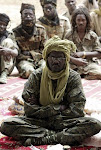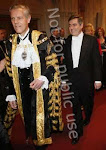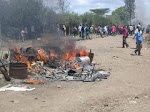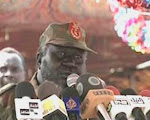"All are equal before the law and are entitled without any discrimination to equal protection of the law. All are entitled to equal protection against any discrimination in violation of this Declaration and against any incitement to such discrimination", http://www.un.org/cyberschoolbus/humanrights/declaration/7.asp
In the previous features, "Integral" discussed the lack of democratic principles in South Sudan and how such disunite the people of South Sudan. It observed the values or pillars of democracy: sovereignty of the people; government based upon consent of the governed; majority rule; minority rights; guarantee of basic human rights; free and fair elections; equality before the law; due process of law; constitutional limits on government; social, economic, and political pluralism; values of tolerance, pragmatism, cooperation, and compromise, http://usinfo.state.gov/products/pubs/whatsdem/whatdm2.htm.
"Integral" promised to examine each one of these pillars. It has already examined "sovereignty of the people"; "government based upon consent of the governed"; "majority rule"; "Minority rights"; and "Free and fair elections". Today's feature is divided into five parts. In this five parts, "Integral" will be looking at "Equality before the law" and its importance as stipulated in the Interim Constitution of South Sudan (ICSS) in Part II Bill of Rights; "Equality before the Law", article 18: "all persons are equal before the law and are entitled to the equal protection of the law without discrimination as to race, ethnic origin, colour, sex, language, religious creed, political opinion, birth, locality or social status. For more information on ICSS, visit: http://www.chr.up.ac.za/undp/domestic/docs/c_SouthernSudan.pdf. As for those willing to follow the "Integral" column right from its onset, visit: http://ohiyok-newsanalysesonline.blogspot.com/.
Equality before the law could be a simple and an understandable phrase if conceived in general terms. Its meaning, however, is as important as its reaffirmation of justice to all irrespective of their political, military and other social statuses or standings. Each one of the words forming the phrase have other meanings but "Integral" will only cherry-pick those that are relevant to the topic. Equality means uniformity; before means in front; and law means jurisprudence; (Collins, 2000:205; 55; 351). Thus, equality before the law could be rephrased as 'uniformity in front of jurisprudence'. This means that law should be applicable to all evenly. In other words, no one is above the law.
How does equality before the law relate to the "Integral" concept: "Disunity in South Sudan"? It does because there is inequality before the law in South Sudan and that breed conflict and conflict is one – if not the main – cause of disunity in many countries around the globe and South Sudan is not an exception। Before linking this discussion upto "Integral"'s line of argument, it is good fair to make the reader know about other examples on the concept of equality before the law.
Looking at the other examples of the rule of law around the world, in its most basic form, rule of law is the principle that no one is above the law. Thomas Paine stated in his pamphlet Common Sense (1776): "For as in absolute governments the king is law, so in free countries the law ought to be king; and there ought to be no other।"
In England, the issuing of the Magna Carta was a prime example of the "rule of law." The Great Charter forced King John to submit to the law and succeeded in putting limits on feudal fees and duties. Another earlier example was Islamic law and jurisprudence, which recognised the equal subjection of all classes, including caliphs and sultans, to the ordinary law of the land।
Perhaps the most important application of the rule of law is the principle that governmental authority is legitimately exercised only in accordance with written, publicly disclosed laws adopted and enforced in accordance with established procedural steps that are referred to as due process. The principle is intended to be a safeguard against arbitrary governance, whether by a totalitarian leader or by mob rule. Thus, the rule of law is hostile both to dictatorship and to anarchy. Samuel Rutherford was one of the first modern authors to give the principle theoretical foundations, in Lex, Rex (1644), and later Montesquieu in The Spirit of the Laws (1748)।
In continental Europe and legal thinking, the rule of law has frequently, but not always, been associated with a Rechtsstaat. According to modern Anglo-American thinking, hallmarks of adherence to the rule of law commonly include a clear separation of powers, legal certainty, the principle of legitimate expectation and "equality" of all "before the law"। The concept is not without controversy, and it has been said that "the phrase 'the Rule of Law' has become meaningless thanks to ideological abuse and general over-use".
Relating these examples to "Integral"'s concept: "Disunity in South Sudan", the readers should be able to understand the meaning of the last sentence in the examples above। It says that the concept: "Equality before the law" is controversial that is probably because it is misused to connote equal application of the law; meaningless perhaps because some ideologies have abused the concept as this normally happens with totalitarian regimes.
Totalitarianism (or totalitarian rule) is a concept used to describe political systems where a state regulates nearly every aspect of public and private life. The term is usually applied to Fascist Italy, Nazi Germany, Shōwa Japan or communist states, such as the Stalinist-USSR, Democratic Kampuchea, Vietnam, Mao-era and modern China and North Korea. Totalitarian regimes or movements maintain themselves in political power by means of an official all-embracing ideology and propaganda disseminated through the state-controlled mass media, a single party that controls the state, personality cults, central state-controlled economy, regulation and restriction of free discussion and criticism, the use of mass surveillance, and widespread use of terror tact.
"New Sudan", a concept in the making that is supposed to show in practical terms the difference between the old and the Sudan under SPLM/A control, could simply be added to the list of modern China and North Korea unfortunately. Terror tact, personality cult and the use of mass surveillance are but common practices in the "New Sudan". This statement may be judged to be unfair by those in the government of South Sudan (GOSS) who want to maintain the status-quo. Some would ask why South Sudan under GOSS should be equated to modern China and North Korea. It is because ideology (mainly revolving around the concept of "New Sudan") carries more meaning than the equal application of the law. For example, there are a number of cases that are awaiting a political decision rather than a court of law. Two of these cases received a political decision already instead of a court of law as the examples bellow could emphasise.
There are three senior members of the South Sudan community, namely Paul Omoya Thomas, an active Colonel in the Sudanese Armed Forces (SAF) and former minister of agriculture in Eastern Equatoria State (EES)-GOSS; Lt-Gen. (Wildlife Rtd) Arkanjello Thomson; and Maj-Gen. Isaac Obuto Mamur Mete, Sudan People's Liberation Army (SPLA) Deputy Chief of Staff (DCOS) for Morale Orientation.
Col. Thomas was accused of trying to assassinate the Speaker of South Sudan Interim Legislative Assembly (SSILA). He was wrongly accused because the arrest was not procedural. More so there is no trained military officer who could lay an ambush while waiting for the enemy on the road within which the ambush is supposedly laid. He had an illegal withdrawal of his immunity by the Governor of EES. He was illegally arrested and detained by SPLA for two years without trial. He was released by a political decision in mid 2008 without charges.
Lt-Gen. (Wildlife Rtd) Thomson was accused of collaboration with the Lord's Resistance Army (LRA). He was arrested and detained by the SPLA with Col. Thomas for two years illegally. He was released by a political decision together with Col. Thomas also without charges.
Maj-Gen. Mete, SPLA DCOS, was accused one year ago by the SPLA of acquiring weapons from, and training soldiers in Uganda, without the consent of the SPLA. He was also accused of failing to account for some cash he allegedly used while chairing the integration of Lt-Gen. Paulino Matip's South Sudan Defence Force officers and men into SPLA. A Military tribunal was formed and a court marshal instituted to try him. The court marshal did not find any evidence sufficient enough to convict him of any wrongdoing.
Both the SPLA affairs acting minister and the SPLA C-in-C; that is 1st-Lt-Gen. Salva Kiir Mayardit, 1st Vice-President and President of GOSS, are not in a position to release him possibly for fear of his reaction and so the case remains as complicated as the reasons for Maj-Gen. Mete's arrest were.
Col. Thomas, Lt-Gen. (Wildlife Rtd) and SPLA's Maj-Gen. Mete and many other South Sudanese have witnessed the GOSS/SPLA tact that deliberately deny detainees the right to courts, trial and the application of the due process of law just to inflict harm on, and perhaps dehumanize, them.
The practice of personality cult in the case of South Sudan includes fearing but not respecting senior leaders of the SPLM/A. Statements like 'had Dr Garang lived nobody could have tempered with GOSS finances; and that the GOSS could have succeeded in many ways' are but serious attachment of hopes on inexistent person. This is very dangerous because the South may not go ahead as its leaders may wait forever and the South together with its citizens will have to face the consequences.
Dr Garang is dead and nothing is going to bring him back. H.E. 1st-Lt-Gen. Mayardit has succeeded him and the only way to make things go in the South is to ensure that Mayardit has a strong cabinet and advisors not sycophants. Sycophants, who promote the practice of personality cult, do not care whether or not Mayardit succeeds in his efforts to rid the South of corrupt leaders and embark on its development so long as they loot the South in his name when the price will have to be paid by Mayardit himself.
From the above examples, how could anyone judge the impact of such on the relationship between the GOSS/SPLA and the people of South Sudan? The answer is simple: mistrust between GOSS/SPLA and the people will continue unabated. This mistrust is there and people in South Sudan are forced to live with it because those who try to address it fear retribution for commenting on the obvious. How does SPLM/A intend to unite the people of South Sudan? Is it through intimidation or understanding? The latter is the way forward but not intimidation of any kind, including misinterpretation of laws in the interest of few individuals who worship other individuals.
Those in GOSS/SPLA who encourage these kinds of practices could be equated to modern Chinese and South Korean leaders. This is because suppression of any kind, especially failure to embrace the due process of the law is inhuman. Due process of law is the principle that the government must respect all of a person's legal rights, instead of just some or most of those legal rights, when the government deprives a person of life, liberty, or property. In the laws of the United States, this principle gives individuals a varying ability to enforce their rights against alleged violations thereof by governments. Due process of law has also been frequently interpreted as placing limitations on laws and legal proceedings, in order for judges instead of legislators to guarantee fundamental fairness, justice, and liberty. The latter interpretation is analogous to the concepts of natural justice and procedural justice used in various other jurisdictions
Equality before the law develops trust between the people and the government. A government that applies law equally gives its own citizens an opportunity to respect and interact with each other as each one of them would be aware of the consequences of committing any crime and its legal repercussions. Once it becomes an acceptable practice, the citizens would see fairness in their government and thus embrace it and, depending on their fair judgment, give it full support when need be.
GOSS/SPLA has failed to exercise fairness on all those it has arrested. Many South Sudanese would emphatically agree with this statement. Take the example of Arthur Akuen, GOSS' former minister of finance who was accused of embezzling money worth millions.
Arthur Akuen was arrested and locked up in prison after he was accused of involvement in the infamous Al Cardinal scandal. Later, however, he was released and upto this moment he lives in his house as a free man. Could the decision to let loose Arthur Akuen have something to do with his immunity as a minister or his affiliation to the ruling tribe?
Assuming that Col. Thomas of the SAF and Lt-Gen. (Rtd) Thomson of the unified police were regarded as enemies, something SPLA never hides from saying, what about Maj-Gen. Mete, the SPLA DCOS? Could this kind of treatment have something to do with the tribe of Maj-Gen. Mete? Would Mete have remained in solitary confinement as he is now for nearly two years had he been from the ruling tribe? Why is Mete's case unique in military law? Can't the SPLA fire him if he is found guilty of corruption, which is widely practiced in GOSS/SPLA?
He could be dismissed without post benefits and either detained in civilian prison or discharged from active service and set free. But should he be clean from all the accusations as this is said to be the case, which awaits a political decision of the C-in-C, he should be cleared and reinstated in his office. It is only mutiny, rebellion and releasing of classified information which is treasonous but not a common practice in South Sudan like corruption.
What is there on planet earth that could be more disuniting to a people with a common destiny than segregation of its own inhabitants on the basis of clan, tribe, creed, colour and nationality? These are things which cannot be practiced by modern governments let alone being encouraged by citizens of the 21st Century। The world that is inherited today by its current leaders was in wars that were caused by divisions on the basis of strength, clan, tribe, creed, colour, you name it. The social contract theorists made possible the adoption of modern states based on the rule of law and equal application of that law on all regardless of their statuses.
In his Leviathan book, Thomas Hobbes, an English scholar mostly known for his scholastic work on social contract, set out his doctrine of the foundation of states and legitimate governments - based on social contract theories. Leviathan was written during the English Civil War; much of the book is occupied with demonstrating the necessity of a strong central authority to avoid the evil of discord and civil war।
Beginning from a mechanistic understanding of human beings and the passions, Hobbes postulates what life would be like without government, a condition which he calls the state of nature. In that state, each person would have a right, or license, to everything in the world. This inevitably leads to conflict, a "war of all against all" (bellum omnium contra omnes), and thus lives that are "solitary, poor, nasty, brutish, and short" (xiii)।
To escape this state of war, men in the state of nature accede to a social contract and establish a civil society. According to Hobbes, society is a population beneath a sovereign authority, to whom all individuals in that society cede their natural rights for the sake of protection. Any abuses of power by this authority are to be accepted as the price of peace. However, he also states that in severe cases of abuse, rebellion is expected. In particular, the doctrine of separation of powers is rejected: the sovereign must control civil, military, judicial and ecclesiastical powers।
As in the words of Hobbes, the GOSS/SPLA top echelon seems to believe that it is sovereign and as such it must be in full control of the civil, military, judicial except the ecclesiastic powers। Hobbes helped the creation of modern states but the states of the 21st century which are based on strong democratic principles separated powers in a modern state and agreed that the people of any nation are sovereign. What seems to be the problem with GOSS/SPLA is their inability to deal with those who undermine the due process of the law by blocking the application of the law on equal basis and depriving the people of South Sudan of their sovereign rights?
Should these corrupt individuals be removed from power to avoid corruption as well as misinterpretation of the law? This may be obvious but it is unlikely because all of them are comrades-in-arms (tribes mates may be) and removing one or two of them may mean a lot of things to those individuals who maintain them, including losing political support base।
The GOSS, however, has to embark on a political awareness programme that should seriously aim at educating those individuals within the SPLM/A who have this misconceived believe that they are in GOSS to stay। They need to be told that governments are not like homes where people retire to. Governments are public institution from where people retire to homes. It should also be made categorically clear that governments are not and shall not be money-making institutions; and that those who are found making money from public institutions – however senior their positions are in government – ought to be tried on equal basis with other criminals.
The lack of due process of law in South Sudan is the main cause for the absence of equality before the law। Therefore, GOSS should not play innocent by burying its head on the sand with a view to ignoring the due process of law. Equality before the law cannot be applied in where there is no due process of law. It is time that the executive in South Sudan reactivates the judiciary to manage and interpret the laws correctly. The judiciary needs to apply law equally on all the citizens, including government officials by following the normally laid down legal procedures; especially those that sanction the stripping off of politicians and senior officers in the organised forces of their immunities to stand trial.
The absence of equality before the law has made some law abiding South Sudanese living abroad to refuse to return home। All South Sudanese follow the events that are taking place at home. Some are asking a lot of questions on hearing of illegitimate arrests and detention of their fellow citizens without the due process of the law. In fact it becomes difficult for someone to leave a country in which his/her rights, legal or otherwise, are respected and protected only to come to where those very rights, legal or otherwise, are violated by none other than the some senior officials in the government who are charged with the duty of protecting those basic rights in the first place.
South Sudanese in Diaspora do long so much for a faster return home. This could be made possible by GOSS which has to implement the due process of law that in turn will support the existence of equality before the law. There is no one in this era of the new world order who would want to stay in an environment which is lawless. Albert Einstein, a German-born theoretical physicist, once said: “As long as I have any choice, I will stay only in a country where political liberty, toleration, and equality of all citizens before the law are the rule।”
Therefore, GOSS needs to promote political liberty, toleration and equality of all citizens before the law as a rule. It is only then that South Sudanese in Diaspora and Northern Sudan will have the courage to return home, a safer home, not the one they ran away from during the war. It is only after the return of all South Sudanese that the unity of South Sudan – based on equality, freedom and justice for all – could be realised.







No comments:
Post a Comment